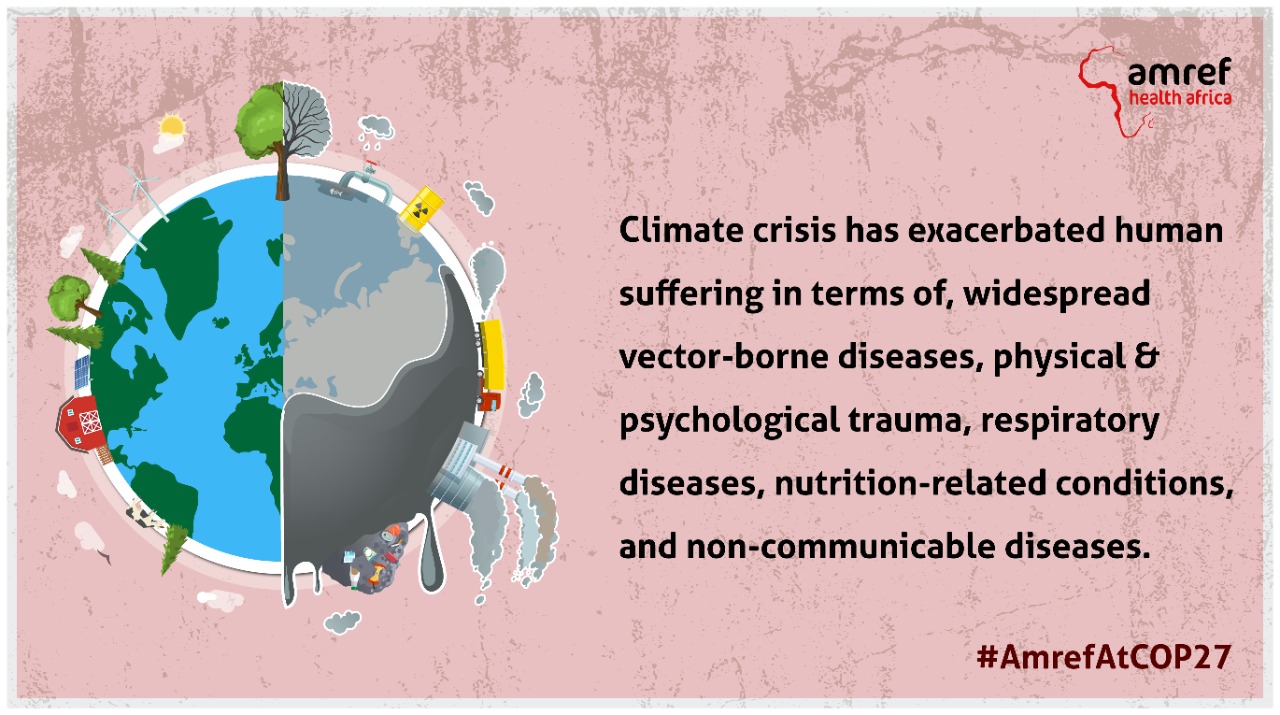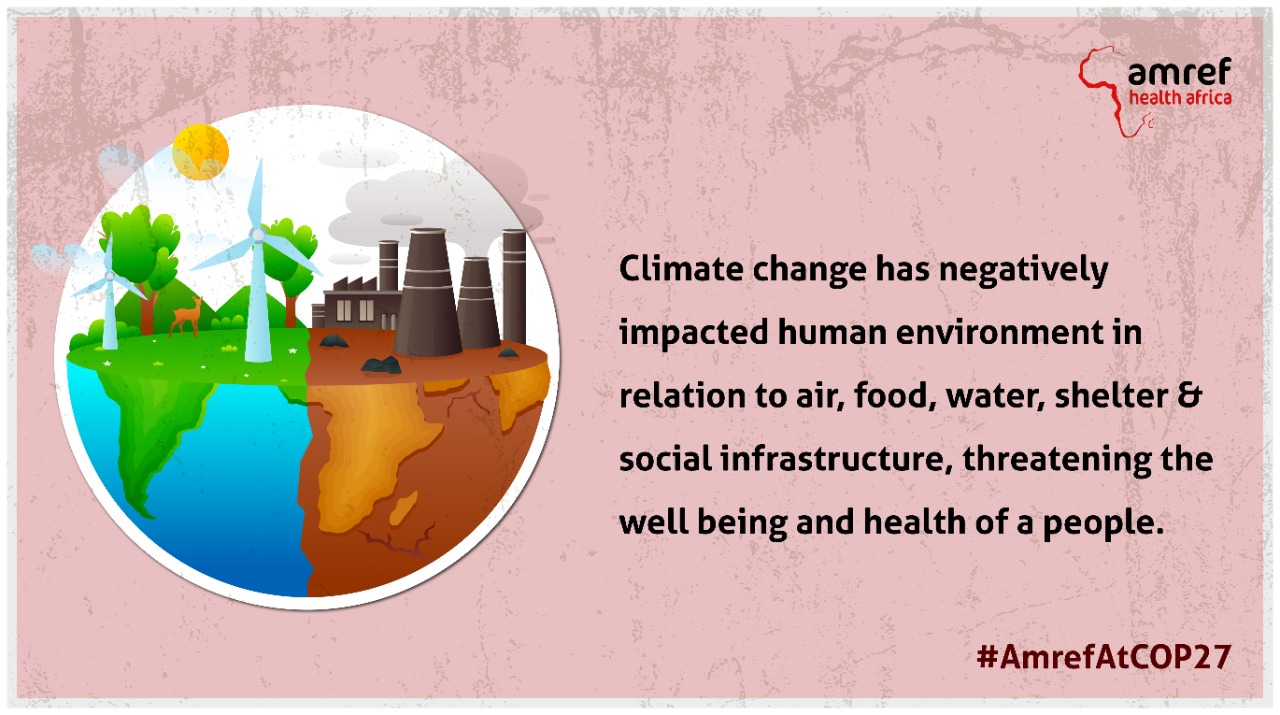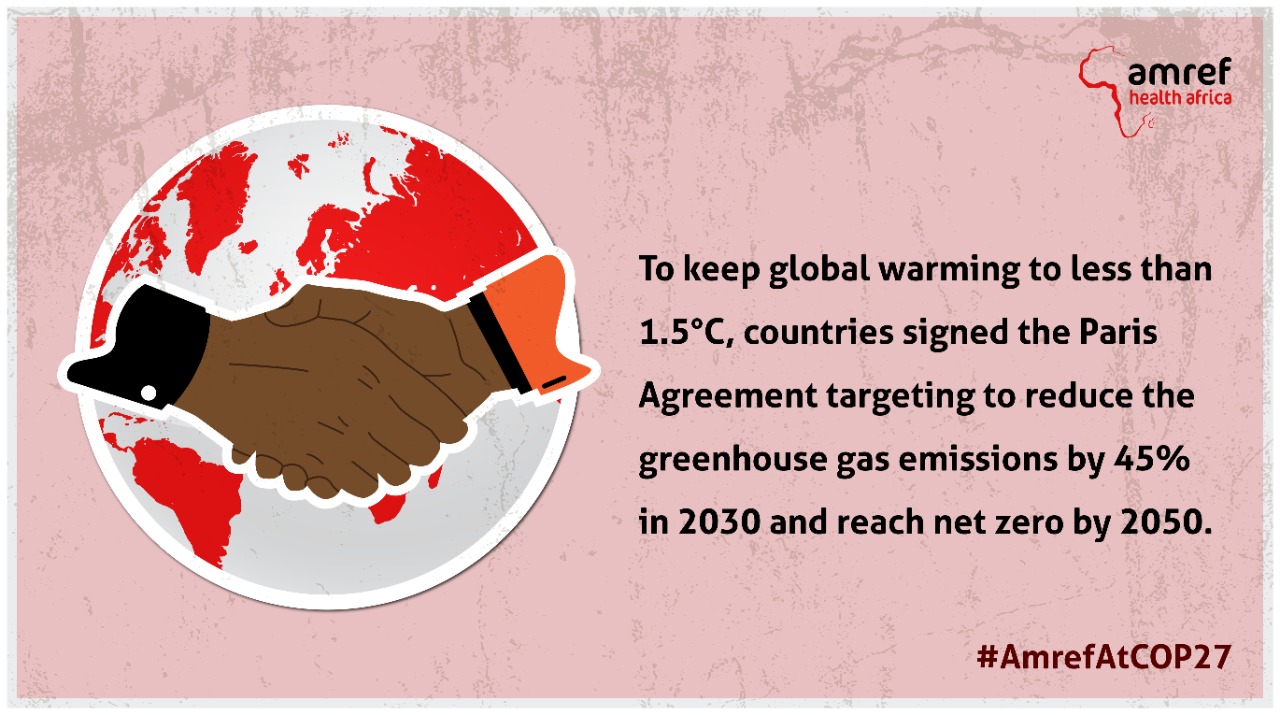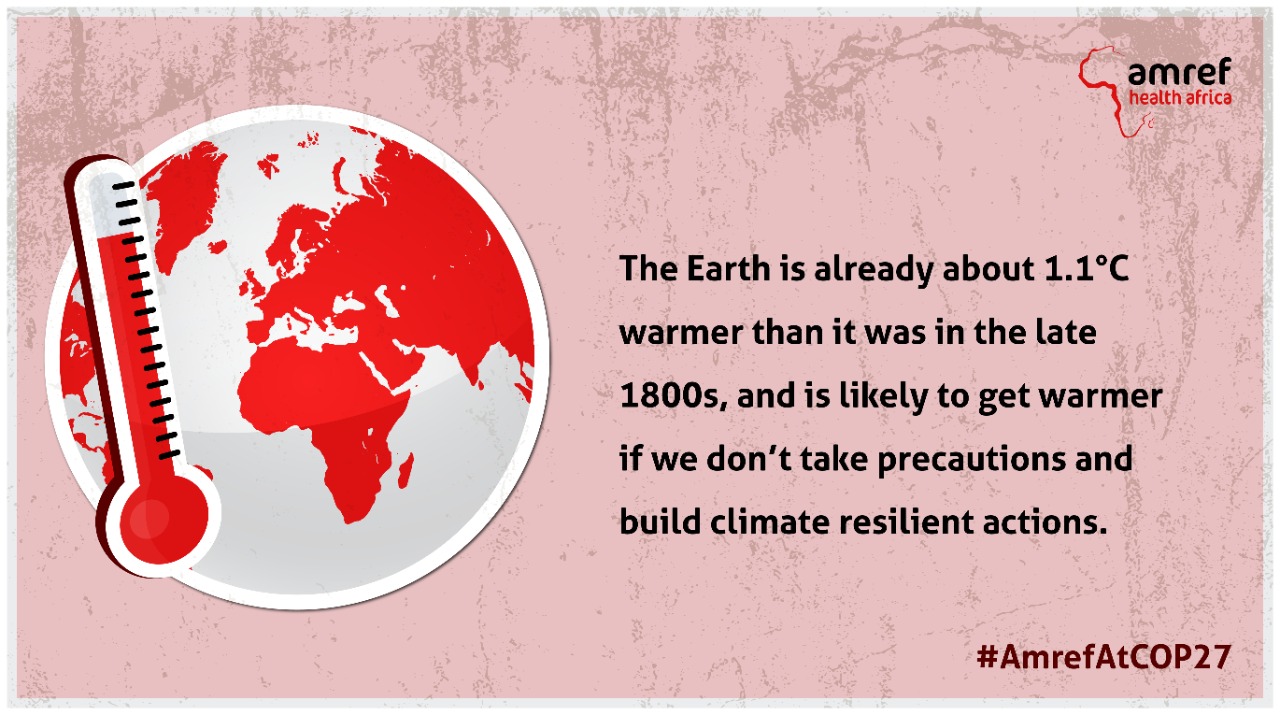Amref High Level Policy Dialogue on Climate Change and Health for Africa
1st - 7th August, 2022
#AmrefAtCOP27
Amref Health Africa, in partnership with the Rockefeller Foundation, is convening a high-level policy dialogue on the sidelines of COP27 to take stock of the progress towards implementation of various health & environment covenants, share best practices and spell out the gaps/barriers to in implementation. We present you a couple of messages that will reinforce the policy discussions at #COP27. Feel free to share as widely as possible.
Share facts about #AmrefAtCOP27
These communication tools are available to share and print during the 2022 United Nations Climate Change Conference (COP27). Feel free to display and/or distribute on social media. On Twitter please tag @Amref_Worldwide when posting graphics from this social media toolkit.
# Primary Hashtags
#AmrefAtCOP27
# Secondary Hashtags
#COP27
Accounts to Follow
Quotes & Graphics
Click any image to preview & download (right click > Save as)
Videos
Play any video to preview, click the tweet button to share the video on Twitter.
Key Messages and Tweets
At the sidelines of #COP27, Amref in collaboration with @wellcometrust and Rockerfeller Foundation hosts a climate & health policy dialogue session to discuss progress made towards the implementation of health & environment covenants & share best practices for adoption #AmrefAtCOP27
The #AmrefAtCOP27 side event offers an opportunity for African policy makers to reflect on countries’ Nationally Determined Contributions (NDCs) and share thoughts on how partners can support the implementation of the short- and long-term climate adaptation and mitigation strategies #AmrefAtCOP27
The #AmrefAtCOP27 side event session will reinforce and mobilize Africa health community to join the climate resilience movement calling for mainstreaming health in climate actions including the negotiations at UNFCCC negotiating streams.
At the sidelines of #COP27, Amref seeks to deepen partnerships for health and climate resilience in Africa for continued multi-sectoral collaboration that will ensure synchronized investments and actions between health and environment sectors #AmrefAtCOP27
The Earth is already about 1.1°C warmer than it was in the late 1800s, and is likely to get warmer if we don’t take precautions and build climate resilient actions. #AmrefAtCOP27
To keep global warming to less than 1.5°C, countries signed the Paris Agreement targeting to reduce the greenhouse gas emissions by 45% in 2030 and reach net zero by 2050. #AmrefAtCOP27
The Nationally Determined Contribution (NDC) synthesis report indicates that countries are not on track to meet the Paris Agreement Goals of 2015. #AmrefAtCOP27
Climate change has negatively impacted human environment in relation to air, food, water, shelter and social infrastructure, threatening the well being and health of a people. #AmrefAtCOP27
Climate crisis has exacerbated human suffering in terms of, widespread vector-borne diseases, physical & psychological trauma, respiratory diseases, nutrition-related conditions, and non-communicable diseases. #AmrefAtCOP27
It is estimated that 250,000 more annual deaths will occur from malnutrition, diarrhea and heat stress. #AmrefAtCOP27
It is estimated that malaria transmission will spread to new geographical regions with potential loss of US$ 2-4 billion in direct health expenses by the year 2030. #AmrefAtCOP27
African countries and their development partners designed the Libreville Declaration Accord on Health and Environment as a framework to coherently address environmental determinants of human health and ecosystems. #AmrefAtCOP27
Only a few African countries have implemented all or ten of the 11 Libreville Declaration priority actions to address the environmental determinants of human health and ecosystems. #AmrefAtCOP27
Challenges impeding climate actions in Africa include, budget constraints, knowledge strengthening inadequacy, poor mechanisms for tracking progress and strengthening the institutional arrangements for coordinated actions between health and environment. #AmrefAtCOP27
Climate change affects the social and environmental determinants of health – clean air, safe drinking water, sufficient food and secure shelter (WHO). #AmrefAtCOP27
Between 2030 and 2050, climate change is expected to cause approximately 250 000 additional deaths per year, from malnutrition, malaria, diarrhoea and heat stress (WHO). #AmrefAtCOP27
The direct damage costs of climate change to health (i.e. excluding costs in health-determining sectors such as agriculture and water and sanitation), is estimated to be between US$ 2-4 billion/year by 2030 (WHO). #AmrefAtCOP27
Areas with weak health infrastructure – mostly in low and middle income countries, have the least ability to cope without assistance to prepare and adequately respond to the effects of climate change. #AmrefAtCOP27
Reducing air pollution through better transport, food and energy-use choices can result in improved health. #AmrefAtCOP27
Human activities are the biggest contributors to climate change which in turn has serious implications to public health. #AmrefAtCOP27
Extreme weather events, variable climates that affect food and water supplies, ecosystem changes are all associated with global warming and pose health risks (WHO). #AmrefAtCOP27
African governments and partners must intensify climate adaptation actions and put health at the centre of interventions. #AmrefAtCOP27
Within the broader context of systematically addressing climate change and health actions, there is need for broader collaboration with different sectors, including transport, energy, agriculture economics, amongst others. #AmrefAtCOP27
Climate change undermine many of the public health gains that have been made in Africa – through drought-induced food insecurity, exacerbation of environmentally sensitive chronic diseases, and enhanced viability of pathogenic microbes and their vectors. #AmrefAtCOP27





